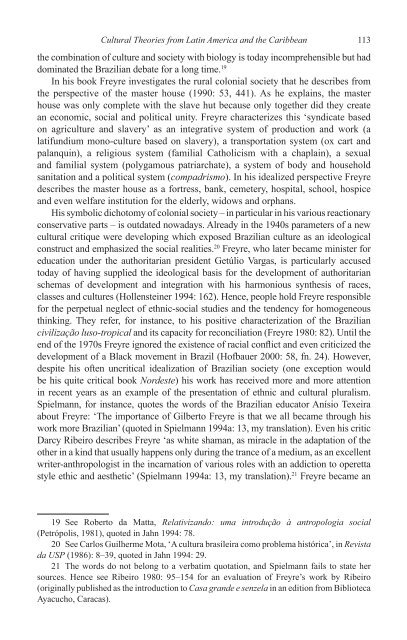You also want an ePaper? Increase the reach of your titles
YUMPU automatically turns print PDFs into web optimized ePapers that Google loves.
Cultural Theories from Lat<strong>in</strong> America and <strong>the</strong> <strong>Caribbean</strong> 113<br />
<strong>the</strong> comb<strong>in</strong>ation <strong>of</strong> culture and society with biology is today <strong>in</strong>comprehensible but had<br />
dom<strong>in</strong>ated <strong>the</strong> Brazilian debate for a long time. 19<br />
In his book Freyre <strong>in</strong>vestigates <strong>the</strong> rural colonial society that he describes from<br />
<strong>the</strong> perspective <strong>of</strong> <strong>the</strong> master house (1990: 53, 441). As he expla<strong>in</strong>s, <strong>the</strong> master<br />
house was only complete with <strong>the</strong> slave hut because only toge<strong>the</strong>r did <strong>the</strong>y create<br />
an economic, social and political unity. Freyre characterizes this ‘syndicate based<br />
on agriculture and slavery’ as an <strong>in</strong>tegrative system <strong>of</strong> production and work (a<br />
latifundium mono-culture based on slavery), a transportation system (ox cart and<br />
palanqu<strong>in</strong>), a religious system (familial Catholicism with a chapla<strong>in</strong>), a sexual<br />
and familial system (polygamous patriarchate), a system <strong>of</strong> body and household<br />
sanitation and a political system (compadrismo). In his idealized perspective Freyre<br />
describes <strong>the</strong> master house as a fortress, bank, cemetery, hospital, school, hospice<br />
and even welfare <strong>in</strong>stitution for <strong>the</strong> elderly, widows and orphans.<br />
His symbolic dichotomy <strong>of</strong> colonial society – <strong>in</strong> particular <strong>in</strong> his various reactionary<br />
conservative parts – is outdated nowadays. Already <strong>in</strong> <strong>the</strong> 1940s parameters <strong>of</strong> a new<br />
cultural critique were develop<strong>in</strong>g which exposed Brazilian culture as an ideological<br />
construct and emphasized <strong>the</strong> social realities. 20 Freyre, who later became m<strong>in</strong>ister for<br />
education under <strong>the</strong> authoritarian president Getúlio Vargas, is particularly accused<br />
today <strong>of</strong> hav<strong>in</strong>g supplied <strong>the</strong> ideological basis for <strong>the</strong> development <strong>of</strong> authoritarian<br />
schemas <strong>of</strong> development and <strong>in</strong>tegration with his harmonious syn<strong>the</strong>sis <strong>of</strong> races,<br />
classes and cultures (Hollenste<strong>in</strong>er 1994: 162). Hence, people hold Freyre responsible<br />
for <strong>the</strong> perpetual neglect <strong>of</strong> ethnic-social studies and <strong>the</strong> tendency for homogeneous<br />
th<strong>in</strong>k<strong>in</strong>g. They refer, for <strong>in</strong>stance, to his positive characterization <strong>of</strong> <strong>the</strong> Brazilian<br />
civilização luso-tropical and its capacity for reconciliation (Freyre 1980: 82). Until <strong>the</strong><br />
end <strong>of</strong> <strong>the</strong> 1970s Freyre ignored <strong>the</strong> existence <strong>of</strong> racial conflict and even criticized <strong>the</strong><br />
development <strong>of</strong> a Black movement <strong>in</strong> Brazil (H<strong>of</strong>bauer 2000: 58, fn. 24). However,<br />
despite his <strong>of</strong>ten uncritical idealization <strong>of</strong> Brazilian society (one exception would<br />
be his quite critical book Nordeste) his work has received more and more attention<br />
<strong>in</strong> recent years as an example <strong>of</strong> <strong>the</strong> presentation <strong>of</strong> ethnic and cultural pluralism.<br />
Spielmann, for <strong>in</strong>stance, quotes <strong>the</strong> words <strong>of</strong> <strong>the</strong> Brazilian educator Anísio Texeira<br />
about Freyre: ‘The importance <strong>of</strong> Gilberto Freyre is that we all became through his<br />
work more Brazilian’ (quoted <strong>in</strong> Spielmann 1994a: 13, my translation). Even his critic<br />
Darcy Ribeiro describes Freyre ‘as white shaman, as miracle <strong>in</strong> <strong>the</strong> adaptation <strong>of</strong> <strong>the</strong><br />
o<strong>the</strong>r <strong>in</strong> a k<strong>in</strong>d that usually happens only dur<strong>in</strong>g <strong>the</strong> trance <strong>of</strong> a medium, as an excellent<br />
writer-anthropologist <strong>in</strong> <strong>the</strong> <strong>in</strong>carnation <strong>of</strong> various roles with an addiction to operetta<br />
style ethic and aes<strong>the</strong>tic’ (Spielmann 1994a: 13, my translation). 21 Freyre became an<br />
19 See Roberto da Matta, Relativizando: uma <strong>in</strong>trodução à antropologia social<br />
(Petrópolis, 1981), quoted <strong>in</strong> Jahn 1994: 78.<br />
20 See Carlos Guilherme Mota, ‘A cultura brasileira como problema histórica’, <strong>in</strong> Revista<br />
da USP (1986): 8–39, quoted <strong>in</strong> Jahn 1994: 29.<br />
21 The words do not belong to a verbatim quotation, and Spielmann fails to state her<br />
sources. Hence see Ribeiro 1980: 95–154 for an evaluation <strong>of</strong> Freyre’s work by Ribeiro<br />
(orig<strong>in</strong>ally published as <strong>the</strong> <strong>in</strong>troduction to Casa grande e senzela <strong>in</strong> an edition from Biblioteca<br />
Ayacucho, Caracas).


















